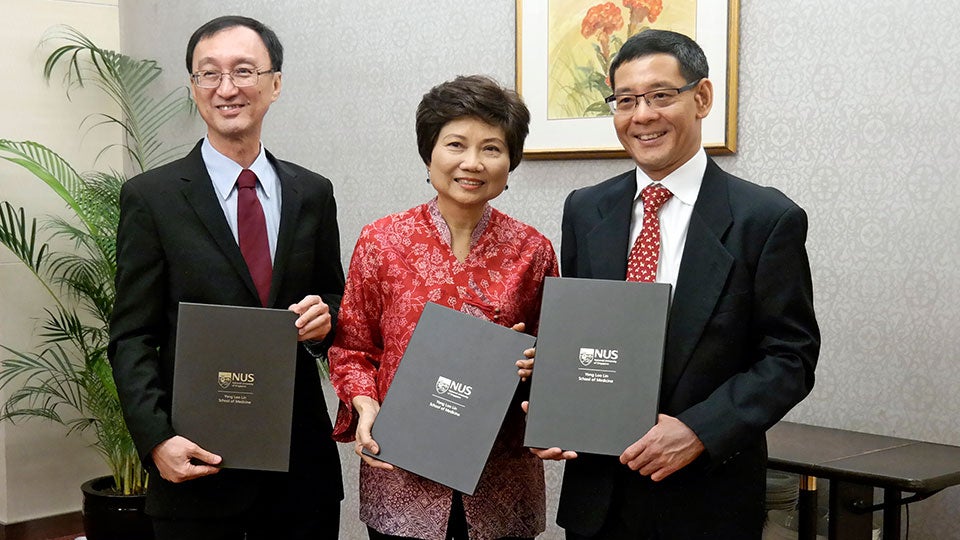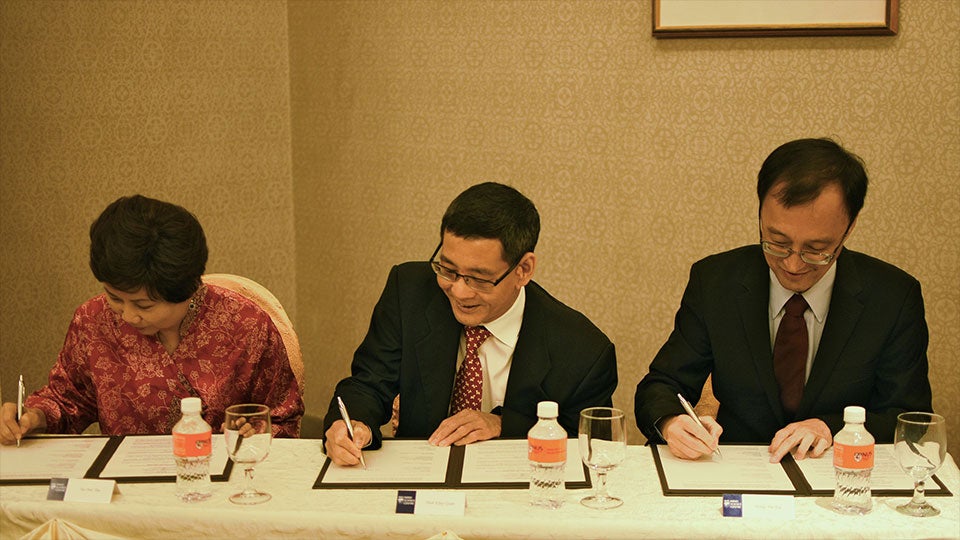Partnership formed to train community health volunteers for the elderly
Published: 20 Feb 2018

Wanted: volunteers to be trained to help keep elderly people mentally alert through planned and structured activities. These volunteers will be trained through online courses as well as classroom sessions taught by experts in a new programme that is being developed by a consortium of agencies and headed by the NUS Mind-Science Centre (NMSC) at the Yong Loo Lin School of Medicine, National University of Singapore (NUS Medicine).
Much of the training will be conducted via a new online portal and is being offered as part of a collaboration among the Centre, the Stroke Support Station (S3) and the Singapore University of Social Sciences (SUSS). The three organisations signed a Memorandum of Understanding today (20 February 2018) to work together on the portal, which they hope will enable people to learn how to care for themselves and their families.
The Age Well Everyday (AWE) programme’s e-portal features health education modules on topics that include depression, stroke, dementia, diabetes mellitus, hypertension, exercise, diet, gardening, mindfulness practice and music reminiscence. The AWE programme is an offshoot of the Dementia Prevention Programme from the Jurong Ageing Study. The organisers aim to make the e-portal the reference site for individuals, healthcare professionals and non-profit organisations involved in healthcare delivery.
Through this initiative, the partners also want to train and certify a corps of at least 120 volunteers with the necessary knowledge and skills to reach out to elderly people across Singapore who are at risk of neurocognitive decline. Eighty per cent of the training programme will be conducted online, while the remaining 20 per cent will be taught by trainers in classroom sessions.
Certified volunteers will then deliver the AWE programme through community centres and other community organisations. For research purposes, the organisers will track the physical and mental health of AWE programme participants through annual physical and psychosocial assessments. A volunteer management system will also be established to deploy volunteers efficiently throughout the country and this will be managed by S3.
The NMSC currently delivers the AWE Programme at six community centres. It aims to extend the programme to 40 centres in five years. To do so, NMSC will need to train 120 volunteers to support up to 2,000 elderly participants.
The MOU that the Centre signed today with the Stroke Support Station and the Singapore University of Social Sciences will see the partners combining resources to implement this community-led public health education programme. Specifically, the Centre will develop user-friendly programmes for dementia prevention and volunteer trainers, and also provide the clinical content by doctors and allied health professionals for the training modules. The Stroke Support Station will co-create and develop user-friendly programmes for stroke survivors, caregivers and volunteer trainers, while the SUSS brings its expertise in adult learning pedagogy to bear. This includes know-how in the development of e-learning portals.
The AWE E-portal will be launched in English through the generous support of public donations. It will be translated into Mandarin and other languages eventually to cater to the various communities here.

Associate Professor Yeoh Khay Guan, Dean of the NUS Yong Loo Lin School of Medicine and the Deputy Chief Executive of the National University Health System, who signed the MOU for NUS said, “Together with our partners, the Stroke Support Station and the Singapore University of Social Sciences, we are embarking on a visionary undertaking to use technology to transform AWE into a community-based health education intervention that is scalable, affordable, accessible and impactful. The creation of an AWE E-portal will offer e-learning in the form of comprehensive self-help preventive healthcare modules. It will enable learners to become active volunteers in the community.”
Ms Chew Poh Yim, Chairman of Stroke Support Station added, “By building a structured programme that promotes an eco-system of learning, participants can build social networks at the community level to help maintain the physical and mental wellbeing of not only themselves but also their family, friends and community by empowering them with knowledge.”
Associate Professor Wong Yue Kee, Vice President (Learning Services) at the Singapore University of Social Sciences, said, “SUSS is a forerunner in e-learning and we are proud to play a part in this meaningful partnership. Our e-learning platform empowers volunteers to learn anytime and anywhere, and most of all, is customised to their needs. The strong social focus of our programmes such as social work, counselling and gerontology also provide useful insights in the course development and process.”
See Press Release.
News Coverage
- The Sunday Times online, 20 February 2018
- The Straits Times, 21 February 2018, Home, pB2
- The New Paper, 21 February 2018, p9
- Lianhe Zaobao, 21 February 2018, p4
- Capital 95.8FM, 8pm news, 20 February 2018


